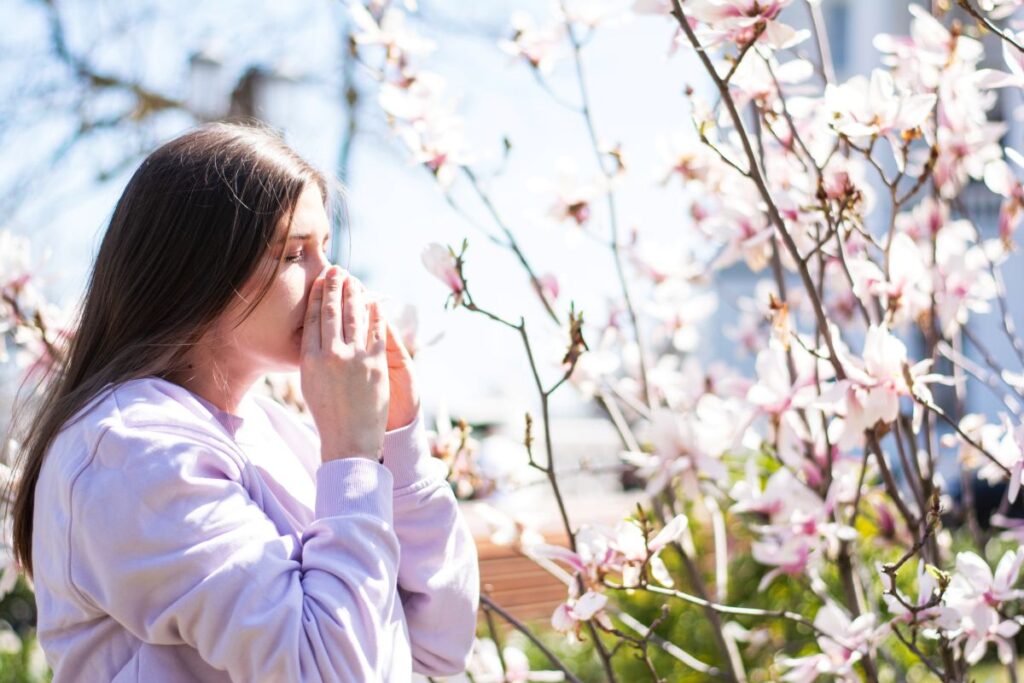How Do You Know If You Are Allergic to Pollen?
Do you find yourself sneezing every spring, with your eyes watering and your nose running uncontrollably? If these symptoms arrive in sync with the blooming of flowers and the onset of warm, breezy days, you might be experiencing a pollen allergy—commonly known as seasonal allergic rhinitis.
In this blog post, we’ll take an in-depth look at how to identify if you’re allergic to pollen, explore some natural remedies to ease your symptoms, and introduce a selection of over-the-counter (OTC) allergy medicine available from My Pharmacy to help you manage your allergy naturally.
What Is a Pollen Allergy?
Pollen allergies occur when the immune system mistakenly perceives pollen as a harmful invader. Pollen is a fine powder released by trees, grasses, and weeds to help fertilize other plants. However, when these tiny, airborne particles enter your nose, eyes, or lungs, your body may respond by releasing chemicals—most notably histamine—that cause the typical allergy symptoms such as:
- Sneezing and a runny or blocked nose
- Itchy, red, or watery eyes
- Itchy throat or ears
- Cough or mild wheezing
- Puffy eyes or dark circles
These symptoms usually appear in a seasonal pattern, with tree pollen most common in the early spring, grass pollen in late spring to summer, and weed pollen (like ragweed) during late summer or fall.

How Do You Know If You’re Allergic?
If you’re frequently experiencing the symptoms mentioned above—especially if they occur every spring or summer—it’s a good indication that pollen might be triggering an allergic reaction. Key points to look out for include:
- Seasonal Pattern: Do your symptoms worsen during specific times of the year, such as when trees bloom or when the wind carries pollen?
- Location-Specific Reactions: Do you notice increased irritation after being outdoors during peak pollen times?
- Skin and Eye Reactions: Are your eyes consistently red and itchy? Do you find yourself using tissues more often?
If these signs describe your experience, you may be allergic to pollen. While a definitive diagnosis can only be made by a healthcare provider using tests like the skin prick test or specific IgE blood test, recognizing these patterns is an important first step.
Natural Remedies for Pollen Allergies
Many people seek natural ways to manage their pollen allergies, either to complement other treatments or to avoid medication. Here are several natural approaches you can try:
1. Saline Nasal Rinse
A simple saline rinse helps flush out pollen particles from your nasal passages, reducing both irritation and inflammation. It’s an effective, drug-free way to clear congestion and is especially useful after spending time outdoors.
2. Local Raw Honey
Consuming a small amount of locally sourced, unpasteurised honey is a popular, though anecdotal, remedy. The theory is that local honey contains traces of pollen, which may help gradually build tolerance in your immune system. Enjoy a teaspoon daily in the months leading up to allergy season.
3. Vitamin C & Natural Antihistamines
Vitamin C is a natural antihistamine that helps reduce the release of histamine in the body. Foods rich in vitamin C—such as citrus fruits, berries, and bell peppers—can be a tasty way to support your body’s natural defenses against allergens.
4. Herbal Teas
Herbal teas like nettle, peppermint, and chamomile not only soothe your throat but also act as mild decongestants and anti-inflammatory agents. Enjoy 2–3 cups a day to help alleviate symptoms naturally.
5. Steam Inhalation with Essential Oils
Inhaling steam infused with essential oils such as eucalyptus or peppermint can help open up your nasal passages, easing breathing and reducing congestion. Simply add a few drops of oil to a bowl of hot water, cover your head with a towel, and inhale the steamy air.
6. Allergy-Proof Your Home
Take proactive steps indoors by:
- Keeping windows shut during high pollen periods
- Using HEPA filters and air purifiers
- Showering and changing clothes promptly after outdoor exposure
OTC Product Recommendations from My Pharmacy
Sometimes natural remedies are best when paired with trusted over-the-counter allergy medicine. Here are five non-prescription options from My Pharmacy that can complement your natural strategies:
- Opticrom Allergy Eye Drops – 10ml
Relieves itchy, red, and watery eyes through a gentle, non-drowsy formula containing sodium cromoglicate.
£5.59 - PiriNatural Breathe Clean Daily Nasal Wash – 100ml
A natural saline solution designed to wash away pollen and irritants from your nasal passages.
£8.09 - Cetirizine 10mg Tablets – 30 Tablets
A fast-acting antihistamine that addresses sneezing, runny nose, and itchy eyes without causing drowsiness.
From £2.99 - Sominex Herbal Relief Tablets – 30 Tablets
Blended with valerian, hops, and passion flower, these tablets are ideal for soothing restlessness and helping you get better sleep during allergy flare-ups.
£4.69 - Healthpoint Hayfever Relief Wipes – 36 Wipes
Aloe vera-infused wipes that remove pollen from your face and hands, reducing irritation after outdoor exposure.
£1.49
Understanding the signs of a pollen allergy is crucial for managing its impact on your life. From natural remedies like saline rinses and herbal teas to effective OTC products such as Opticrom eye drops and Cetirizine tablets, there are plenty of options to help you breathe easier. Incorporating these strategies into your routine can reduce symptoms and improve your overall quality of life during the allergy season.
At My Pharmacy, we’re here to support you with a wide range of non-prescription allergy relief products — conveniently available for next-day delivery across the UK.
If you’re experiencing seasonal symptoms and want to explore these natural and OTC options further, why not have a look at our full range of allergy products today?












